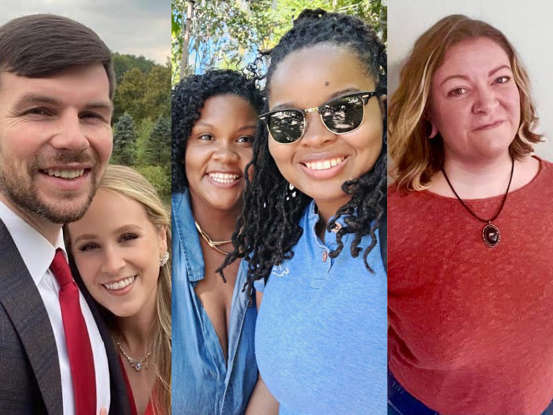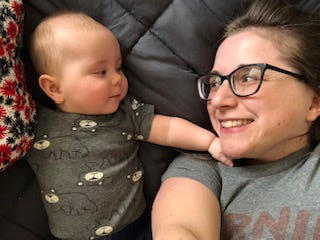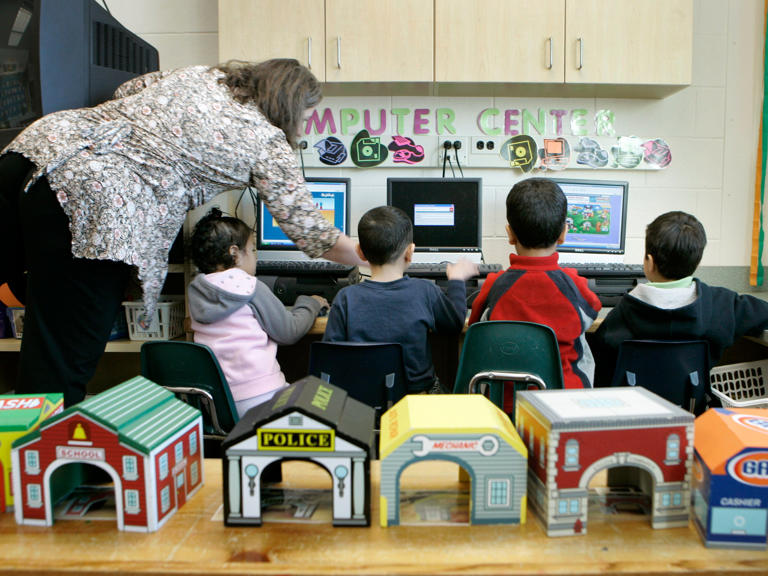AMERIKA
CHILD CARE SHOULD BE A FREE PUBLIC SERVICE
Kaitlin Peterson is a millennial parent paying tens of thousands of dollars for day care.
She left her job when she realized day-care costs were higher than her take-home salary.
Peterson is one of many millennials grappling with what parenting looks like in today's economy.

5 Gen Zers and millennials who make more than $100,000 say you should consider skipping that vacation. Saving and not having to worry about money is the only way to ever feel like you've 'made it.'
We asked five Gen Zers and millennials earning six figures whether they feel like they've "made it."
Some said "yes" because they don't have to worry about money and live a comfortable lifestyle.
Some said a six-figure salary could feel smaller after expenses like childcare and housing.
Many millennials and Gen Zers dream of the day they can wake up and say, "I made it." Some say a higher salary is the key to reaching this goal.
Gen Zers, the oldest of whom are 26, are just entering the workforce, while many millennials, who are 27 to 42, are well into their careers. A SmartAsset analysis of Bureau of Labor Statistics data from the third quarter of last year found that the median salary of a 25- to 34-year-old in the US was $52,156, while the median salary of a 35- to 44-year-old was $62,244.
While these salaries are higher than they were a few years ago, they're far off from what many young people hope to achieve. In 2021, Americans said they'd need to earn $122,000 a year on average to feel that they're in good financial shape, according to a survey by Personal Capital and Harris Poll that polled more than 2,000 people.
But this was before inflation surged over the past few years. With the high costs of things like housing, college, healthcare, and childcare, what's enough for young Americans to feel like they've "made it"?
We asked five Gen Zers and millennials who earned six figures last year what that money has done for them, what it hasn't done, and whether overall they feel like they've made it. Insider viewed documents to verify their incomes.
Kaitlin Peterson is a millennial parent paying tens of thousands of dollars for day care.
She left her job when she realized day-care costs were higher than her take-home salary.
Peterson is one of many millennials grappling with what parenting looks like in today's economy.
This story is part of a series called "Millennial World," which seeks to examine the state of the generation around the globe.
In 2022, Kaitlin Peterson, 34, paid nearly $22,700 for preschool — for just one kid.
When her second child came around, she realized that care for both of her children would cost $500 more per month than her take-home pay as a senior librarian.
So she quit.
"It was basically like working so that my kids could go to day care, and someone else could take care of them, and still not making enough money to actually even pay for the privilege of having them being cared for by someone else," she said.
Now, she works at home full-time caring for her 7-month-old daughter, but still pays for preschool for her 3-and-½-year-old son. She expects it to cost even more this year. Her partner works full time, and another part of the reason she's even able to afford that arrangement is because her father unexpectedly passed away while she was pregnant, leaving behind money from his 401(k) that made it financially possible for her to leave work entirely.
Without that money, Peterson said she thinks that she and her family would've had to leave their home in Denver completely or tighten their budget a lot.
"I'd still rather have my dad," she said.
"He gave me a gift of sorts, but also it's an absolute travesty that the only way that I can afford to have children in this country is for my father to pass away at such a young age," Peterson added.

Kaitlin Peterson and one of her two children. Kaitlin Peterson© Provided by Business Insider
In 2022, Kaitlin Peterson, 34, paid nearly $22,700 for preschool — for just one kid.
When her second child came around, she realized that care for both of her children would cost $500 more per month than her take-home pay as a senior librarian.
So she quit.
"It was basically like working so that my kids could go to day care, and someone else could take care of them, and still not making enough money to actually even pay for the privilege of having them being cared for by someone else," she said.
Now, she works at home full-time caring for her 7-month-old daughter, but still pays for preschool for her 3-and-½-year-old son. She expects it to cost even more this year. Her partner works full time, and another part of the reason she's even able to afford that arrangement is because her father unexpectedly passed away while she was pregnant, leaving behind money from his 401(k) that made it financially possible for her to leave work entirely.
Without that money, Peterson said she thinks that she and her family would've had to leave their home in Denver completely or tighten their budget a lot.
"I'd still rather have my dad," she said.
"He gave me a gift of sorts, but also it's an absolute travesty that the only way that I can afford to have children in this country is for my father to pass away at such a young age," Peterson added.

Kaitlin Peterson and one of her two children. Kaitlin Peterson© Provided by Business Insider
Gen Zers and millennials say they can't afford to have families
Peterson isn't alone in feeling the economic crunch. As traditional generational milestones — including owning a home, starting a family, and even retiring — feel more out of reach for the new generations rising through the workforce and parenthood, some millennials are opting out of having kids altogether.
Indeed, a recent Deloitte survey of over 22,000 Gen Zers and millennials from across the globe found that over half of respondents from both generations said they live paycheck to paycheck. A high cost of living remains their biggest concern, as ever-increasing prices weigh on already pandemic- and recession-stricken generations.
All of that has led half of responding Gen Zers and 47% of responding millennials to report that they expect starting a family to "become harder or impossible." For people like Peterson, that means navigating a mode of parenting that looks very different from that of prior generations.
"A lot of our friends don't have children, aren't married, or aren't even really with partners," she said. "It's a strange time, I think, compared to maybe some previous generations where it was just sort of expected that everyone had children."
And with homeownership out of sight — and rent high — for many, younger workers may not necessarily be able to afford to rent or buy in the areas they grew up in. Buying and renting costs have skyrocketed, outpacing wages for many.
"All of our family lives in another part of the country as well," Peterson said. "We don't really have a village of any sort. Like when our kid gets sick and we have to go to the urgent care at night, it's just us. When I went into labor with my daughter, we frantically were calling all of our friends seeing if anyone could come watch our son."
Peterson has no regrets about having kids, but understands why people opt out
Even with all of the challenges she faces as a millennial parent, Peterson said she finds immense joy in having children. "All the struggles aside, no regrets. I absolutely adore my children. They've made me a better person," she said.
But she also understands and respects why some people do not want kids. Parenthood changes your entire life, and that's not right for everyone.
"Anyone who tells you that like, 'Oh, you can just fit a kid into your life' — they're lying," Peterson said. "That's not how it works."
Peterson believes that you can have a "totally fulfilling" life without children; for her, her life is more fulfilled with them. And a major restructuring of how the US treats parents and childcare would "dramatically" change her life.
When her family rented a home, she said, her childcare costs were more than rent. It was like "paying for an additional house just for our son to go to daycare."
"As a capitalist society, we emphasize so much the work portion and we put the family aspect to the wayside, but there's still this expectation that there's going to be the continuation of family life," she said. "It's just not feasible to have both the way that things are currently set up."
All of that gets at a disconnect Peterson sees in the US: Deprioritizing childcare, making it difficult for parents to find affordable care and for care workers to earn a living wage.
"It would have to be a huge societal shift generally to make childcare affordable and for that early child development to even be an emphasis," she said. "So, in some ways, it's not enough to just talk about how do we make childcare more affordable, but how do we change as a society to truly value children, parents, and workers, all at the same time."
Peterson isn't alone in feeling the economic crunch. As traditional generational milestones — including owning a home, starting a family, and even retiring — feel more out of reach for the new generations rising through the workforce and parenthood, some millennials are opting out of having kids altogether.
Indeed, a recent Deloitte survey of over 22,000 Gen Zers and millennials from across the globe found that over half of respondents from both generations said they live paycheck to paycheck. A high cost of living remains their biggest concern, as ever-increasing prices weigh on already pandemic- and recession-stricken generations.
All of that has led half of responding Gen Zers and 47% of responding millennials to report that they expect starting a family to "become harder or impossible." For people like Peterson, that means navigating a mode of parenting that looks very different from that of prior generations.
"A lot of our friends don't have children, aren't married, or aren't even really with partners," she said. "It's a strange time, I think, compared to maybe some previous generations where it was just sort of expected that everyone had children."
And with homeownership out of sight — and rent high — for many, younger workers may not necessarily be able to afford to rent or buy in the areas they grew up in. Buying and renting costs have skyrocketed, outpacing wages for many.
"All of our family lives in another part of the country as well," Peterson said. "We don't really have a village of any sort. Like when our kid gets sick and we have to go to the urgent care at night, it's just us. When I went into labor with my daughter, we frantically were calling all of our friends seeing if anyone could come watch our son."
Peterson has no regrets about having kids, but understands why people opt out
Even with all of the challenges she faces as a millennial parent, Peterson said she finds immense joy in having children. "All the struggles aside, no regrets. I absolutely adore my children. They've made me a better person," she said.
But she also understands and respects why some people do not want kids. Parenthood changes your entire life, and that's not right for everyone.
"Anyone who tells you that like, 'Oh, you can just fit a kid into your life' — they're lying," Peterson said. "That's not how it works."
Peterson believes that you can have a "totally fulfilling" life without children; for her, her life is more fulfilled with them. And a major restructuring of how the US treats parents and childcare would "dramatically" change her life.
When her family rented a home, she said, her childcare costs were more than rent. It was like "paying for an additional house just for our son to go to daycare."
"As a capitalist society, we emphasize so much the work portion and we put the family aspect to the wayside, but there's still this expectation that there's going to be the continuation of family life," she said. "It's just not feasible to have both the way that things are currently set up."
All of that gets at a disconnect Peterson sees in the US: Deprioritizing childcare, making it difficult for parents to find affordable care and for care workers to earn a living wage.
"It would have to be a huge societal shift generally to make childcare affordable and for that early child development to even be an emphasis," she said. "So, in some ways, it's not enough to just talk about how do we make childcare more affordable, but how do we change as a society to truly value children, parents, and workers, all at the same time."

5 Gen Zers and millennials who make more than $100,000 say you should consider skipping that vacation. Saving and not having to worry about money is the only way to ever feel like you've 'made it.'
We asked five Gen Zers and millennials earning six figures whether they feel like they've "made it."
Some said "yes" because they don't have to worry about money and live a comfortable lifestyle.
Some said a six-figure salary could feel smaller after expenses like childcare and housing.
Many millennials and Gen Zers dream of the day they can wake up and say, "I made it." Some say a higher salary is the key to reaching this goal.
Gen Zers, the oldest of whom are 26, are just entering the workforce, while many millennials, who are 27 to 42, are well into their careers. A SmartAsset analysis of Bureau of Labor Statistics data from the third quarter of last year found that the median salary of a 25- to 34-year-old in the US was $52,156, while the median salary of a 35- to 44-year-old was $62,244.
While these salaries are higher than they were a few years ago, they're far off from what many young people hope to achieve. In 2021, Americans said they'd need to earn $122,000 a year on average to feel that they're in good financial shape, according to a survey by Personal Capital and Harris Poll that polled more than 2,000 people.
But this was before inflation surged over the past few years. With the high costs of things like housing, college, healthcare, and childcare, what's enough for young Americans to feel like they've "made it"?
We asked five Gen Zers and millennials who earned six figures last year what that money has done for them, what it hasn't done, and whether overall they feel like they've made it. Insider viewed documents to verify their incomes.

No comments:
Post a Comment